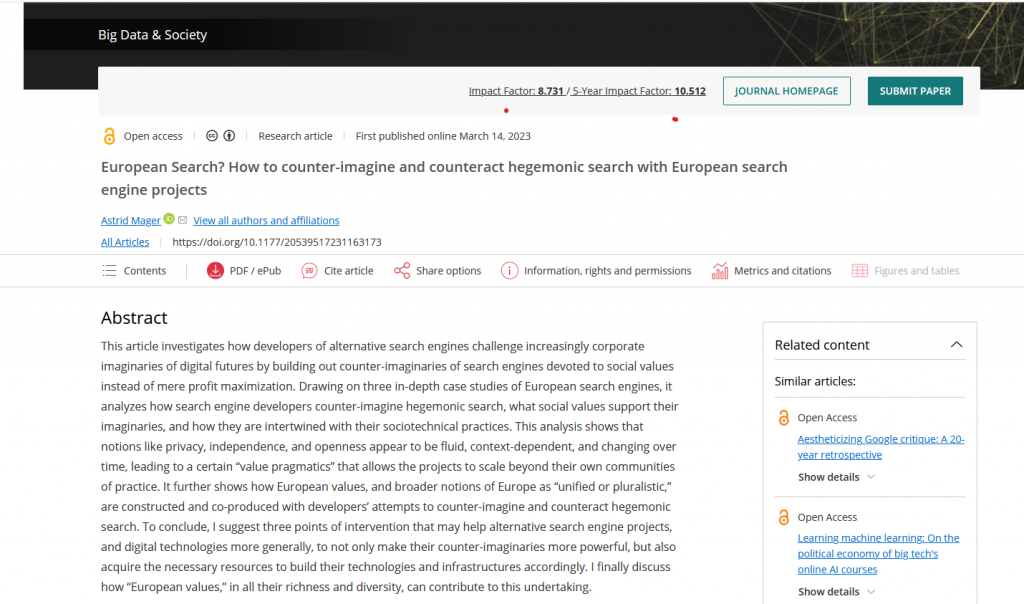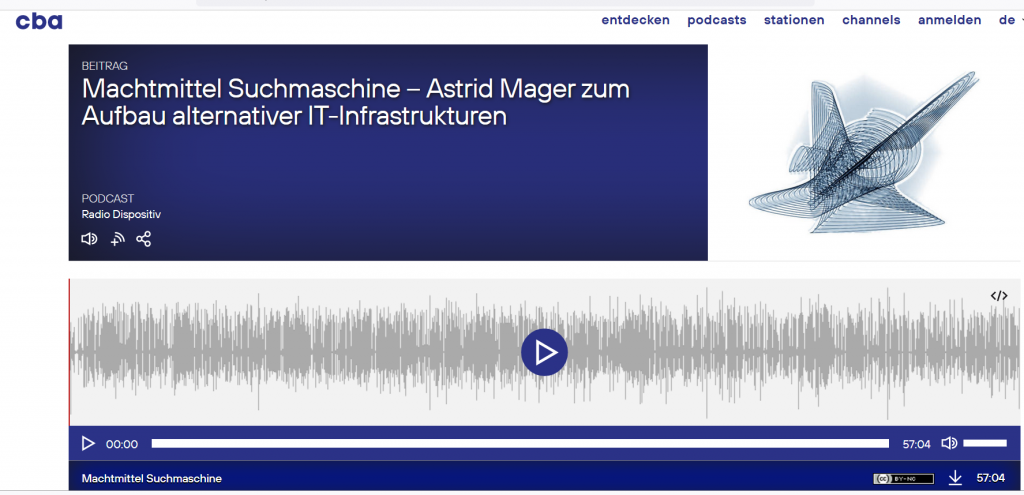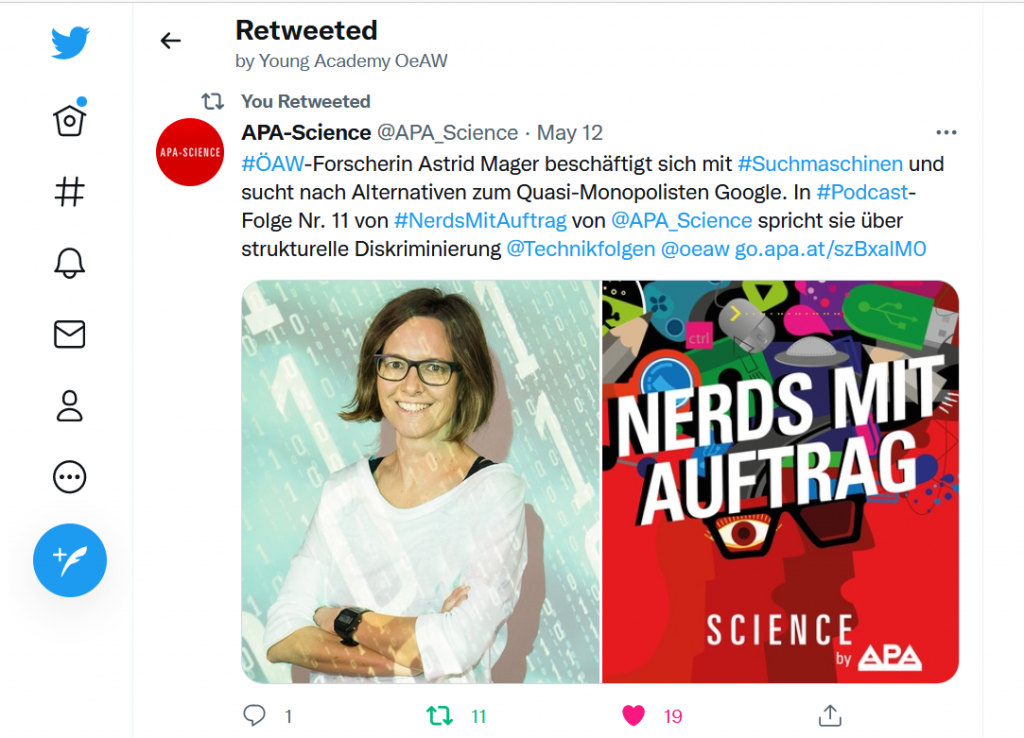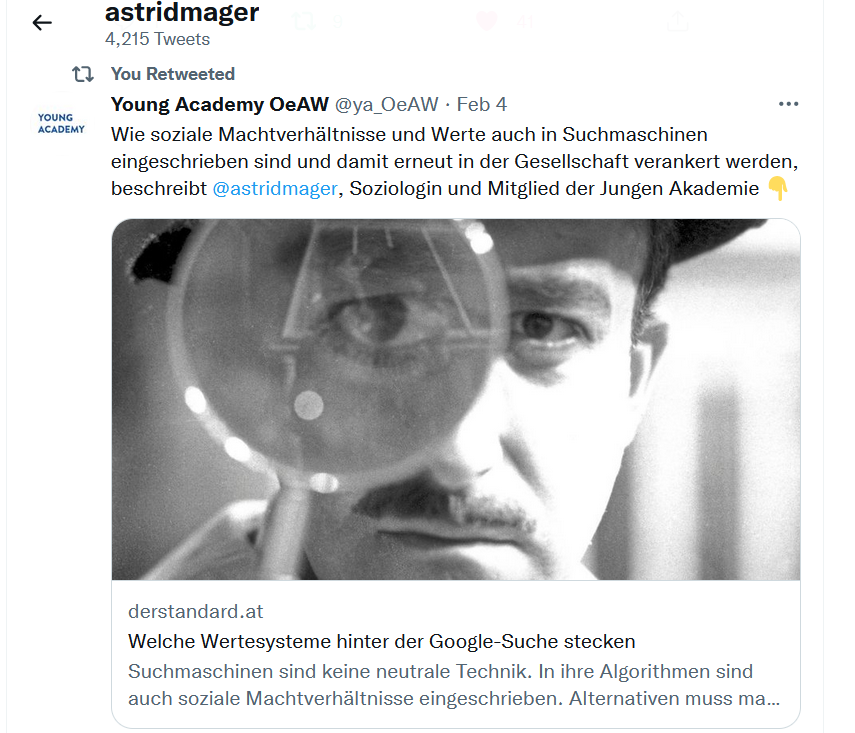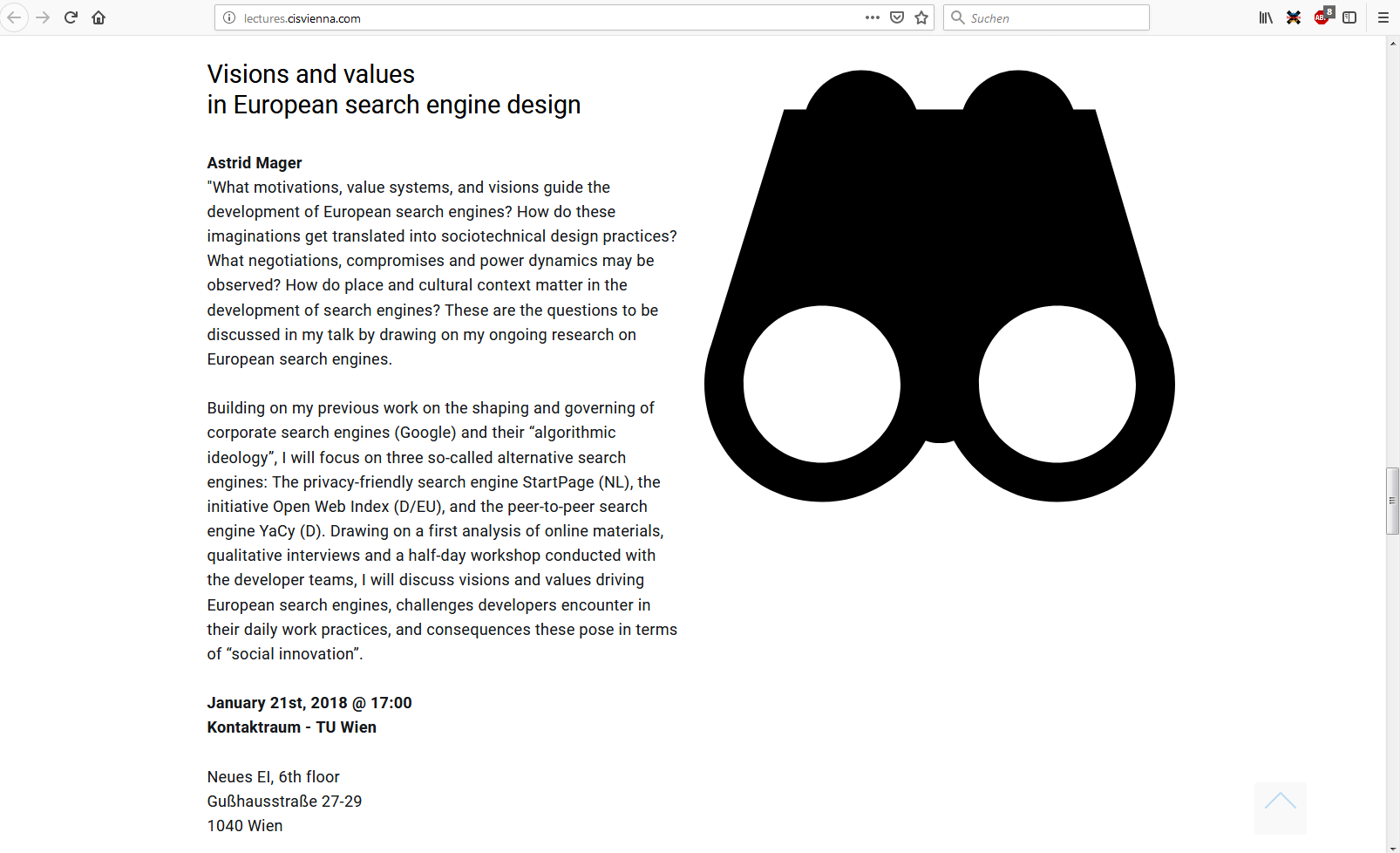I’m very happy that my BD&S special issue article is online now!  It’s called “European Search? How to counter-imagine and counteract hegemonic search with European search engine projects” – it was a bit of a tough nut since critiquing big tech and their sociotechnical imaginaries appears to be much easier than thinking about (and realizing!) alternative technologies and their counter-imaginaries. And that’s exactly why we need to shift our attention from dominant, often corporate imaginaries towards alternative tech and their counter-imaginaries of digital futures – especially in the European context where notions of value-based Europe are strongly pushed in EU policy rhetoric, but remain empty catchphrases often times. To sum up, I’m proud that this article is out now & I would love to hear what you guys think about it!!
It’s called “European Search? How to counter-imagine and counteract hegemonic search with European search engine projects” – it was a bit of a tough nut since critiquing big tech and their sociotechnical imaginaries appears to be much easier than thinking about (and realizing!) alternative technologies and their counter-imaginaries. And that’s exactly why we need to shift our attention from dominant, often corporate imaginaries towards alternative tech and their counter-imaginaries of digital futures – especially in the European context where notions of value-based Europe are strongly pushed in EU policy rhetoric, but remain empty catchphrases often times. To sum up, I’m proud that this article is out now & I would love to hear what you guys think about it!!
Tag Archives: search engine
BD&S special issue The State of Google Critique and Intervention
 Look at this! Our special issue in Big Data & Society (co-edited by Cristian Norocel, Richard Rogers, and me) on The State of Google Critique and Intervention has started to fill up with an excellent commentary by Bernhard Rieder titled Towards a Political Economy of Technical Systems: The Case of Google. Stay tuned, there is more to come in the next weeks!!
Look at this! Our special issue in Big Data & Society (co-edited by Cristian Norocel, Richard Rogers, and me) on The State of Google Critique and Intervention has started to fill up with an excellent commentary by Bernhard Rieder titled Towards a Political Economy of Technical Systems: The Case of Google. Stay tuned, there is more to come in the next weeks!!
Thanks to Matt Zook for his valuable help throughout the publication process! & Olof Sundin & Alison Gerber for the Search Symposium they organized in Lund (2021), where the idea for the special issue was initially born! Thanks also to the Institute of Technology Assessment for co-organizing the writing workshop in Vienna (2022) and the Austrian Science Fund (FWF) for funding the event (and the project Algorithmic Imaginaries in the first place).
Talk Radio: Machtmittel Suchmaschine
Im Oktober habe ich mal wieder mit Herbert Gnauer über Suchmaschinen diskutiert (Radio Dispositiv auf Orange, 94.0). Genauer über alternative Suchmaschinen, sowie den Aufbau offener – öffentlich finanzierter – IT Infrastrukturen. Ein offener Web Index könnte die Grundlage für die Entwicklung von ganz unterschiedlichen Suchmaschinen, Ranking-Instrumenten, und Applikationen sein. Er könnte dem gegenwärtigen Monopolisten (Google) eine reichhaltige, buntere, diversere Suchmaschinenlandschaft entgegensetzen. Diese würde wesentlich besser zu unseren “europäischen Werten” – und hier insbesondere dem pluralen, multikulturellen, und diversen Europa – passen, als hegemoniale Ansprüche ein “europäisches Google” zu bauen, dem Europa kaum gerecht werden kann – alleine schon deshalb, weil Europa ganz anders funktioniert als die USA (und China) – Stichwort Datenschutz, aber auch kulturelle Eigenheiten, verschiedene Sprachen, fragmentierte Märkte etc, die es positiv nutzbar zu machen gilt! Ein offener Web Index – wie übrigens auch das dezentrale social network Mastodon – halten daher nicht nur alternative, verteilte, nachhaltigere Technologien für uns bereit, sondern auch alternative Imaginationen von Europa, die es weiter zu verfolgen gilt.
Zwei Initiativen machen sich hier insbesondere starkt: Die Open Web Index Initiative und die Open Search Foundation, die beide den Aufbau einens offenen Web Indexes anstreben. Es lohnt sich diese großartigen Projekte im Detail unter die Lupe zu nehmen!
Vielen Dank Herbert, dass Du diesen Ideen Raum in Deiner Sendung geboten hast! Es ist mir immer wieder eine Freude! Spoiler: zwei wiss. Artikel dazu sind gerade im Erscheinen (Big Data & Society) & in Begutachtung (book Project Europe) – more info coming soon!
Link zur Sendung Dispositiv auf Radio Orange 94.0: Machtmittel Suchmaschine – Astrid Mager zum Aufbau alternativer IT-Infrastrukturen
podcast time
If you’re interested in corporate search engines from the US and alternative search infrastructures from Europe listen to these two podcasts that were produced by the Austrian Press Agency (APA Science, Nerds mit Auftrag) and the Austrian Academy of Sciences (MAKRO MIKRO); both in German. 
event & panel discussion: google, governance, & possible interventions
On the 12th of April we’ll host a big event at the newly renovated Austrian Academy of Sciences. I’ll first present the results of my long-standing habilitation project “Algorithmic Imaginaries” (funded by the Austrian Science Fund; Elise Richter Program), followed by a panel discussion with leading search engine scholars from all over Europe. Together with Elizabeth Van Couvering, Rosie Graham, and Bernhard Rieder we’ll discuss Google, surveillance capitalism, and discrimination; moderated by Ov Cristian Norocel and Richard Rogers. All infos and registration on-site can be found here; there’ll be a stream too!
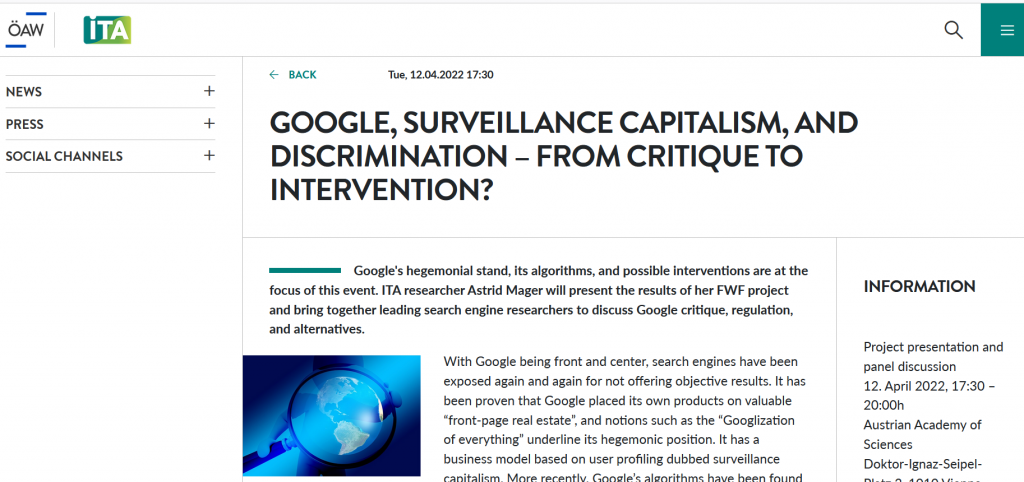 Before the public event we’ll be holding a writing workshop at the Institute of Technology Assessment to discuss the manuscripts for our special issue “From Google Critique to Intervention” to be published by Big Data & Society. I’m already looking forward to this get-together!! The video of the event can be found here.
Before the public event we’ll be holding a writing workshop at the Institute of Technology Assessment to discuss the manuscripts for our special issue “From Google Critique to Intervention” to be published by Big Data & Society. I’m already looking forward to this get-together!! The video of the event can be found here. 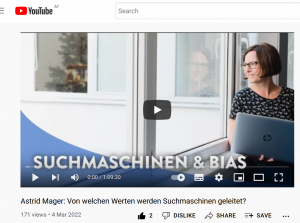
If you’d like to learn more about my project “Algorithmic Imaginaries” you might watch this video of the lecture I gave in Feburary as part of the ÖAW’s gender & diversity lecture series (in German). This lecture sparked quite some media attention including a cover in Der Standard’s “Forschung Spezial” 
conference travels from the past..
In Austria, we’re diving through the “4th Corona wave” right now including a hard lockdown. Yet again, I’m sitting in my home (office) with the kids on my lap in case more than two school kids get infected in the same class. The responsibility has been fully shifted onto teachers, parents, and their kids by now. Politics has given up on the Covid-management of schools, as it seems. In the middle of this chaos, I’m enthusiastically thinking back to my (real!) trip to Lund two months ago. Olof Sundin and Alison Gerber invited me to give a keynote lecture at the interdisciplinary symposium In Search of Search (and its Engines). This workshop was a kind of gathering of pioneering search engine scholars that accompany me since my PhD (more than 15 years now). I finally met Elizabeth van Couvering, for example, whose work on the commercialization of Google and the creation of its business model based on the “traffic commodity” had a great impact on my PhD research. Also, Richard Rogers, Dirk Lewandowski, Jutta Haider, and other great scholars were there and it was FUN! (and not only because of the real food & drinks!) The best part is that we keep the lively debates about search engines, search engine research, and its academic & sociopolitical impact alive. We’re currently working on a special issue for Big Data & Society called The State of Google Critique and Intervention co-edited by Ov Cristian Norocel, Richard Rogers, and myself. We’re planning a workshop and a public event in Vienna (12 April 2022), which I love to organize in the middle of this 4th wave as a possibility to work towards a light at the end of the tunnel.. 😉 So stay tuned!
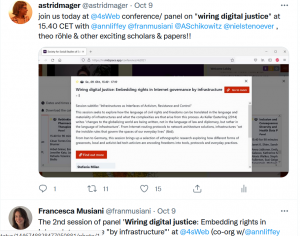 Moreover, almost as an exception to the rule, I attended a great 4S online session this year: Wiring digital justice: Embedding rights in Internet governance by infrastructure organized by Stefania Milan, Niels ten Oever, and Francesca Musiani. Despite the shitty online platform the conference was running on, the session organizers managed to trigger fruitful discussions by providing thoughtful comments after each of the presentations. My paper was titled “Encoding Freedom: Analysis of open search technology between German hacker ethics and Asian start-up culture” and triggered debates about Chinese tech development and the “metrics of freedom” that I’m still thinking about – now that I finally have time to analyze my rich empirical materials on open source communities and other alternative search projects.
Moreover, almost as an exception to the rule, I attended a great 4S online session this year: Wiring digital justice: Embedding rights in Internet governance by infrastructure organized by Stefania Milan, Niels ten Oever, and Francesca Musiani. Despite the shitty online platform the conference was running on, the session organizers managed to trigger fruitful discussions by providing thoughtful comments after each of the presentations. My paper was titled “Encoding Freedom: Analysis of open search technology between German hacker ethics and Asian start-up culture” and triggered debates about Chinese tech development and the “metrics of freedom” that I’m still thinking about – now that I finally have time to analyze my rich empirical materials on open source communities and other alternative search projects.
media coverage
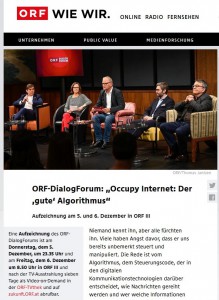 Last year, my work has been covered by various media outlets and events. First, the Austrian Academy of Sciences (ÖAW) made a portrait/ interview with me on the way visions and values shape search engines as part of their series “Forschen für Europa”. This piece included a fancy foto shooting, as you can see here. Second, I was invited to take part in the panel discussion of the ORF Public Value event “Occupy Internet. Der gute Algorithmus” (together with Tom Lohninger from epicenter.works, Matthias Kettemann from the Hans-Bredow-Institut and Franz Manola from the ORF Plattformmanagement). The live discussion took place at the “Radiokulturhaus” and was aired in ORF 3 thereafter. Here you can find the abstract, the press release and the video in case you want to watch the whole discussion. Finally, I was invited as a studio guest to the radio broadcast “Punkt 1” at Ö1 “Das eingefärbte Fenster zur Welt“, where I spoke about alternative search engines and people could phone in and ask questions per email. Talk radio it is! 😉 – all in German.
Last year, my work has been covered by various media outlets and events. First, the Austrian Academy of Sciences (ÖAW) made a portrait/ interview with me on the way visions and values shape search engines as part of their series “Forschen für Europa”. This piece included a fancy foto shooting, as you can see here. Second, I was invited to take part in the panel discussion of the ORF Public Value event “Occupy Internet. Der gute Algorithmus” (together with Tom Lohninger from epicenter.works, Matthias Kettemann from the Hans-Bredow-Institut and Franz Manola from the ORF Plattformmanagement). The live discussion took place at the “Radiokulturhaus” and was aired in ORF 3 thereafter. Here you can find the abstract, the press release and the video in case you want to watch the whole discussion. Finally, I was invited as a studio guest to the radio broadcast “Punkt 1” at Ö1 “Das eingefärbte Fenster zur Welt“, where I spoke about alternative search engines and people could phone in and ask questions per email. Talk radio it is! 😉 – all in German.
50 internet myths
Today, the Internet Governance Forum started in Berlin. As part of this huge event the edited volume “Busted! The Truth About the 50 Most Common Internet Myths“ will be launched. This wonderful volume – edited by Matthias Kettemann & Stephan Dreyer – is a compilation of common Internet myths and their deconstructions. Here is the link to the whole book: https://internetmythen.de (English and German; including summaries in all five UN languages). Enjoy!!
I’ve contributed Myth #19: Search engines provide objective results:
Myth: Search engines deliver objective search results. This is the founding myth of the leading search engine in the Western World: Google. 20 years later this founding myth still exists in Google’s company philosophy. More importantly, however, it resonates in people’s minds. Without knowing how the search engine actually works, many users say that the best websites can be found on top.
Busted: In 1998, the founding year of Google, Sergey Brin and Larry Page described their search engine’s central aim as follows: „The primary goal is to provide high quality search results over a rapidly growing World Wide Web.“ (Brin and Page 1998: 115). Accordingly, the notions “quality” and “search quality” feature over 30 times in their research paper. The authors depict the PageRank algorithm – originally using the number and quality of hyperlinks a website gets, anchor text and proximity to determine the quality of a website and rank it accordingly – as their main competitive advantage. They describe the algorithm as “objective measure” corresponding well to “people’s subjective idea of importance” (Brin and Page 1998: 109). Interestingly, this seems to be the case indeed. Having asked people why they use Google to find online health information in the context of my PhD project, most people answered with saying that Google delivered the best search results, implicitly shaping the search engine as a tool for quality assurance. Without knowing – or even thinking about – how the search engine actually works, Google’s founding myth was reproduced in people’s stories.
But it is a myth. Search engines are no neutral, objective technologies, but rather tightly intertwined with societal norms, values and ideologies; the capitalist ideology most importantly. Over the past decades, Google’s “techno-fundamentalist” ideology of neutral ranking was aligned with and overshadowed by non-objective considerations. New media scholars started to deconstruct the myth of objectivity soon after the search engine’s successful market entry. At first, they challenged the PageRank algorithm by arguing that it would threaten the democratic ideal of the web (#28) by systematically preferring big, well-connected, often commercial websites at the expense of smaller ones. Later they switched over to questioning search engines’ business models based on user-targeted advertising and the commercialization of search engine results and privacy issues these trigger. A major criticism in this body of work concerns the ‘consumer profiling’ conducted by Google – and others like Bing – that enable search engines to adjust advertisements to users’ individual interests. (#21; #22)
Due to the growing amount of user data these companies acquired, the search algorithm and the “organic” search results changed too. Besides hyperlinks other factors were thrown into the measuring of a website’s quality including user profiles and click behaviour most particularly, but also the structure of a website, timeliness, and the amount of keywords and content. Accordingly, new media researchers, but increasingly also journalists, criticized the intensified personalization of search engine results, search engine biases and discrimination. This illustrates that search algorithms are tightly intertwined with the business models their companies rely on. The capitalist ideology is embedded in search engines and “acts through algorithmic logics and computational systems“ (Mager 2014: 32).
Truth: It is important to keep in mind that search engines and their algorithms are no neutral technologies, but rather incorporate societal values and ideologies; the capitalist ideology most importantly. Only then may we come up with forward-looking governance models respecting local regulations and resonating with human rights (especially in Europe, where data protection is enshrined as a fundamental right).
Source: Sergey Brin and Lawrence Page, The anatomy of a large-scale hypertextual Web search engine, Computer Networks and ISDN Systems 30: 107- 117 (1998); Astrid Mager, Defining Algorithmic Ideology: Using Ideology Critique to Scrutinize Corporate Search Engines, tripleC 12(1): 28-39 (2014).
die macht der algorithmen
Radiosendung zum Thema “Die Macht der Algorithmen”. Mit vielem lieben Dank an Herbert Gnauer!! Radio Dispositiv zu hören auf Orange 94.0 @HerbertGnauer
lecture @ technical university of vienna
In January I was kindly invited to give a lecture on my habilitation project “Algorithmic Imaginaries“. This talk was part of the lecture series “Aspects of the Digital Transformation” at the The Centre for Informatics and Society (CIS) of the Faculty of Informatics. Thanks a lot to Florian Cech and Hilda Tellioglu for the warm welcome including fine wine and bread! Thanks also to the audience who triggered really interesting discussions! You can find the video on the C!S website if you want to watch it (in English):

